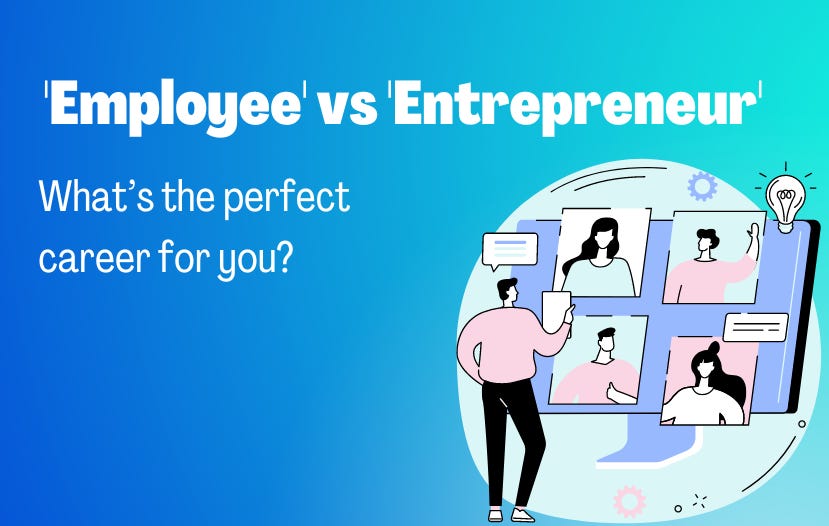What’s the perfect career for you?

To be your own boss or grow in the corporate world with nothing to lose of your own, is a question that possesses everyone during their initial years. Deciding on a career path can be one of the most important choices you make in your life. It is a choice you must get right because failure to choose the right career path can be a recipe for disaster.
It is important to define your goals and weigh in on what would be more beneficial for you because there truly isn’t one true answer that fits everyone.
Decide for yourself as we break down the pros and cons of employment vs entrepreneurship.
Work-life balance: When you work for a company, your hours are usually mentioned in your contract (with clauses for overtime, etc.) and decided upon when you are recruited. This means that if you wish to work from 9 to 5, you may do so. This can help you strike a better balance between work and personal life, which is vital for many people with families.
Less accountability: You won't need to labour around the hours to ensure the entire firm runs properly because you're simply accountable for certain dedicated responsibilities.
Consistent pay and perks: When we talk about an employee, an individual gets a guaranteed income, and the risk involved in it is much less when compared to an entrepreneur. Employees enjoy a fixed income and stable work schedules.
Dependency: As an employee, you are subject to the rules and guidelines imposed by the organization and must follow your employer's orders. Even if you disagree with orders or management practices, you must be careful about how you express yourself because you do not have the flexibility to make your own choices.
Limited Scope: Working for a corporation usually entails having a particular role or function within that organization. You are typically compartmentalized into one category and may have limited opportunities for development or professional advancement outside of your trajectory or industry.
Income constraints: As an employee, your income is set and confined to the negotiated salary. Your income will not rise even if the company reaps major profits that year or if you perform well (unless you have prior agreed-upon incentives or a bonus structure).
Office rivalries: Operating with a large group of individuals may require you to contend with others for acknowledgment or to get your ideas enacted. You don't usually get to pick your colleagues or who gets employed, so you have to put up with them, irrespective of their conduct.
Independence: Entrepreneurs have the autonomy and liberty to establish their businesses from scratch and decide for themselves. They are not required to report to anybody and have complete control over how, where, and when they work. They can also decide how to establish their management style and who to recruit.
Flexibility: Greater flexibility lies with independence. Entrepreneurs have the ability to customize their working time and establish their own schedules. Working 80-hour weeks are common at the outset, but if they have the correct resources, connections, and capacity to decentralize the setup, they may be flexible with their hours and schedule.
Financial growth potential: Entrepreneurs are not bound by a wage, and their revenue is not limited. Hence, their capacity for financial growth is far greater than that of an employee. Entrepreneurs own their own businesses and typically receive a big portion of the earnings
Endless possibilities: The options as an entrepreneur are not bound or limited. You can investigate all aspects of an organization and participate in any element (marketing, HR, business development, etc.). You control your own destiny and can network and build a limitless variety of connections to help your company prosper.
Difficulty balancing professional and personal life: As an entrepreneur, you must devote a significant amount of effort to establishing your own business for many years, working extremely long hours.
Involves risk: Starting your own business is extremely risky, and many entrepreneurs and businesses fail. Not only does one have to deal with the financial risks of their company failing, but also the need to tackle the legal risks and liabilities of starting a business. Entrepreneurship often necessitates a significant investment with no certainty of a return.
Financial instability: One doesn't have a consistent income as an entrepreneur. For the first few years, a major chunk of the funds will be invested in building the business. The finances are fully contingent on the firm's performance and growth.
Job or Business- both are great. We often don’t appreciate what we have in hand and just feel that we are missing out on something that others have. Before taking a final decision, it is important to undergo a self and market analysis and then decide. Success is decided by an individual’s hard work, dedication, and foresight for the right opportunities.

